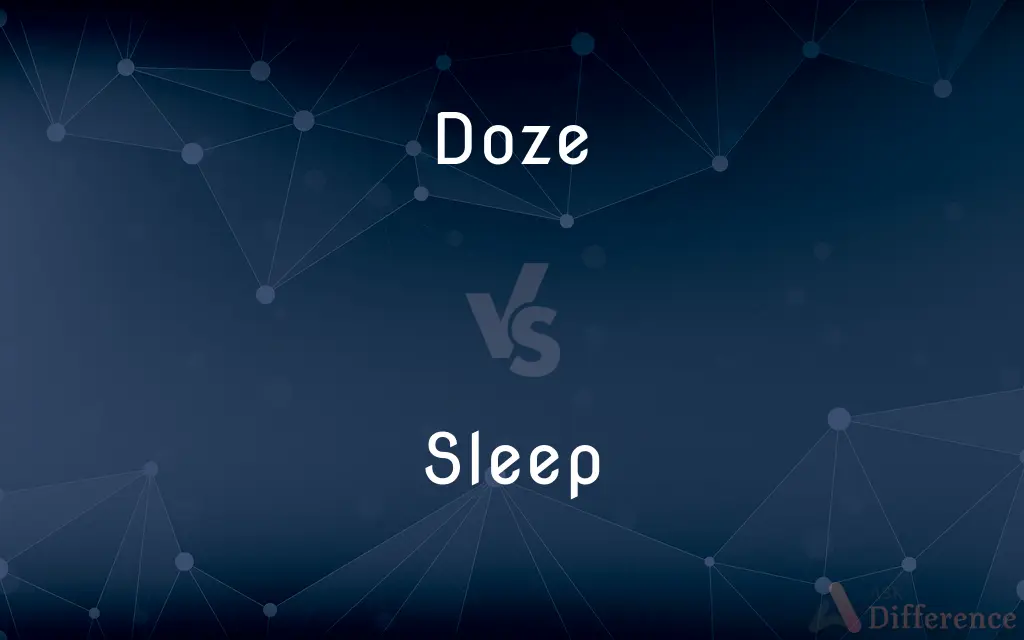Doze vs. Sleep — What's the Difference?
By Urooj Arif & Maham Liaqat — Updated on April 2, 2024
Doze refers to a light, brief nap, while sleep is a deeper, longer restorative state.

Difference Between Doze and Sleep
Table of Contents
ADVERTISEMENT
Key Differences
Dozing is a shallow form of sleep that can occur unintentionally, often characterized by brief periods of nodding off. This state is usually short-lived and can happen in situations where the person is not fully comfortable or in an ideal sleeping environment, such as sitting up in a chair or while travelling. Dozing does not typically allow the body to enter the deeper sleep stages necessary for full rest and recovery. Sleep, on the other hand, is a vital, restorative process that the body requires for health and well-being. It involves several stages, including deep sleep and REM (rapid eye movement) sleep, which are crucial for physical rest, cognitive function, and emotional regulation. Unlike dozing, sleep is usually intentional and occurs in a comfortable setting where the body can relax fully, such as lying in bed.
While dozing might occur spontaneously and last for only a few minutes to half an hour, sleep is usually planned and extends for a longer duration, typically several hours in a cycle that supports the body's needs. This longer period allows the body to go through multiple cycles of sleep stages, each playing a unique role in health and well-being.
Dozing can be seen as a way the body attempts to catch a brief rest when full sleep is not possible, providing a temporary feeling of refreshment. However, it is not a substitute for sleep. Relying on dozing instead of sleeping can lead to sleep deprivation, affecting mood, cognitive abilities, and overall health.
Despite their differences, both dozing and sleeping are natural responses to the body's need for rest. Where dozing offers a quick way to recharge, albeit superficially, sleep provides the necessary depth of rest for recovery, growth, and health maintenance.
Comparison Chart
Duration
Brief, minutes to half an hour
Longer, several hours
ADVERTISEMENT
Depth
Light, shallow
Deep, including various sleep stages
Intentionality
Often unintentional
Typically intentional
Benefits
Temporary rest and refreshment
Restorative, supports physical and mental health
Setting
Can occur anywhere, often sitting up
Usually in a comfortable, lying down position
Compare with Definitions
Doze
To fall into a light sleep unintentionally.
He dozed in the armchair in front of the TV.
Sleep
Requires a comfortable environment conducive to rest.
A quiet, dark room is ideal for sleep.
Doze
Occurs in less than ideal conditions for deep sleep.
It's easy to doze off in a warm, cozy room.
Sleep
A natural, restorative state of rest for the body and mind.
Getting enough sleep is crucial for health.
Doze
A quick way to rest without fully sleeping.
I dozed on the train ride home.
Sleep
Essential for physical and mental recovery.
Athletes prioritize sleep for muscle recovery.
Doze
Not entering deep sleep stages.
Despite trying to stay awake, she dozed for a few minutes.
Sleep
Involves cycles of deep and REM stages.
Dreaming occurs during REM sleep.
Doze
A light, brief sleep, especially during the day.
She found herself dozing off during the lecture.
Sleep
Intentionally engaging in a lengthy rest period.
She sleeps eight hours nightly for optimal health.
Doze
To sleep lightly and intermittently.
Sleep
Sleep is a naturally recurring state of mind and body, characterized by altered consciousness, relatively inhibited sensory activity, reduced muscle activity and inhibition of nearly all voluntary muscles during rapid eye movement (REM) sleep, and reduced interactions with surroundings. It is distinguished from wakefulness by a decreased ability to react to stimuli, but more reactive than a coma or disorders of consciousness, with sleep displaying different, active brain patterns.
Doze
To spend (time) dozing or as if dozing
Dozed the summer away.
Sleep
A natural periodic state of rest for the mind and body, in which the eyes usually close and consciousness is completely or partially lost, so that there is a decrease in bodily movement and responsiveness to external stimuli. During sleep the brain in humans and other mammals undergoes a characteristic cycle of brain-wave activity that includes intervals of dreaming.
Doze
To use a bulldozer; bulldoze.
Sleep
A period of this form of rest.
Doze
A short, light sleep.
Sleep
A state in which a computer shuts off or reduces power to its peripherals (such as the display or memory) in order to save energy during periods of inactivity.
Doze
(intransitive) To sleep lightly or briefly; to nap, snooze.
I didn’t sleep very well, but I think I may have dozed a bit.
Sleep
(Botany) The folding together of leaflets or petals at night or in the absence of light.
Doze
(transitive) To make dull; to stupefy.
Sleep
A crust of dried tears or mucus normally forming around the inner rim of the eye during sleep.
Doze
To bulldoze.
Sleep
To be in the state of sleep or to fall asleep.
Doze
A light, short sleep or nap.
I felt much better after a short doze.
Sleep
To be in a condition resembling sleep.
Doze
To slumber; to sleep lightly; to be in a dull or stupefied condition, as if half asleep; to be drowsy.
If he happened to doze a little, the jolly cobbler waked him.
Sleep
To pass or get rid of by sleeping
Slept away the day.
Went home to sleep off the headache.
Doze
To pass or spend in drowsiness; as, to doze away one's time.
Sleep
To provide sleeping accommodations for
This tent sleeps three comfortably.
Doze
To make dull; to stupefy.
I was an hour . . . in casting up about twenty sums, being dozed with much work.
They left for a long time dozed and benumbed.
Sleep
(intransitive) To rest in a state of reduced consciousness.
You should sleep eight hours a day.
Doze
A light sleep; a drowse.
Sleep
(transitive) To be slumbering in (a state).
To sleep a dreamless sleep
Doze
A light fitful sleep
Sleep
To achieve or make happen by manner of sleep.
Sleep your way to good health.
He hoped to sleep his troubles away.
Doze
Sleep lightly or for a short period of time
Sleep
(transitive) To accommodate in beds.
This caravan can sleep four people comfortably.
Sleep
(intransitive) To be careless, inattentive, or unconcerned; not to be vigilant; to live thoughtlessly.
Sleep
(intransitive) To be dead; to lie in the grave.
Sleep
(intransitive) To be, or appear to be, in repose; to be quiet; to be unemployed, unused, or unagitated; to rest; to lie dormant.
A question sleeps for the present; the law sleeps
Sleep
To wait for a period of time without performing any action.
After a failed connection attempt, the program sleeps for 5 seconds before trying again.
Sleep
To place into a state of hibernation.
Sleep
To spin on its axis with no other perceptible motion.
When a top is sleeping, it is spinning but not precessing.
Sleep
To cause (a spinning top or yo-yo) to spin on its axis with no other perceptible motion.
Sleep
(uncountable) The state of reduced consciousness during which a human or animal rests in a daily rhythm.
I really need some sleep.
We need to conduct an overnight sleep test to diagnose your sleep problem.
Sleep
An act or instance of sleeping.
I’m just going to have a quick sleep.
Sleep
A night.
There are only three sleeps till Christmas!
Sleep
(uncountable) Rheum, crusty or gummy discharge found in the corner of the eyes after waking, whether real or a figurative objectification of sleep (in the sense of reduced consciousness).
Wipe the sleep from your eyes.
Sleep
A state of plants, usually at night, when their leaflets approach each other and the flowers close and droop, or are covered by the folded leaves.
Sleep
The hibernation of animals.
Sleep
To take rest by a suspension of the voluntary exercise of the powers of the body and mind, and an apathy of the organs of sense; to slumber.
Watching at the head of these that sleep.
Sleep
To be careless, inattentive, or uncouncerned; not to be vigilant; to live thoughtlessly.
We sleep over our happiness.
Sleep
To be dead; to lie in the grave.
Them also which sleep in Jesus will God bring with him.
Sleep
To be, or appear to be, in repose; to be quiet; to be unemployed, unused, or unagitated; to rest; to lie dormant; as, a question sleeps for the present; the law sleeps.
How sweet the moonlight sleep upon this bank!
Sleep
To be slumbering in; - followed by a cognate object; as, to sleep a dreamless sleep.
Sleep
To give sleep to; to furnish with accomodations for sleeping; to lodge.
Sleep
A natural and periodic state of rest during which consciousness of the world is suspended;
He didn't get enough sleep last night
Calm as a child in dreamless slumber
Sleep
A torpid state resembling sleep
Sleep
A period of time spent sleeping;
He felt better after a little sleep
There wasn't time for a nap
Sleep
Be asleep
Sleep
Be able to accommodate for sleeping;
This tent sleeps six people
Common Curiosities
Is dozing beneficial?
Dozing can offer a temporary feeling of restfulness but is not a substitute for the health benefits of sleep.
How long should a typical sleep last?
Most adults need between 7 to 9 hours of sleep per night for optimal health.
Can you control dozing?
Dozing often occurs spontaneously, especially in situations of tiredness or boredom, and is harder to control compared to planned sleep.
Can dozing replace sleep?
No, dozing cannot replace sleep as it does not provide the deep restorative stages required for full body and mind recovery.
How can I prevent dozing off during the day?
Ensuring adequate nighttime sleep, staying active, and engaging in stimulating activities can help prevent dozing off.
Does dozing affect sleep quality?
Frequent dozing, especially late in the day, can disrupt nighttime sleep patterns and overall sleep quality.
What is the main difference between dozing and sleeping?
Dozing is a brief, light form of sleep, often unintentional, while sleeping is a deeper, longer, and restorative state.
Why is REM sleep important?
REM sleep is crucial for cognitive functions such as memory, learning, and emotional regulation.
What causes dozing?
Dozing can be caused by a lack of sufficient sleep, boredom, or sitting in a comfortable and warm environment.
Can lying down lead to dozing?
Lying down in a comfortable setting can lead to dozing if one is tired, though it often transitions to deeper sleep.
Is it normal to doze off quickly?
Quickly dozing off can indicate sleep deprivation or exhaustion, signaling the need for more quality sleep.
Can a power nap be considered dozing?
Yes, power naps are short periods of sleep similar to dozing, designed to quickly rejuvenate the mind and body.
What are the signs of sleep deprivation?
Symptoms include fatigue, irritability, difficulty concentrating, and increased susceptibility to illness.
How does the body benefit from sleep?
Sleep supports physical health by allowing the body to repair itself, and is crucial for brain function and emotional well-being.
What role does the environment play in sleep?
A conducive environment, quiet, dark, and comfortable, is crucial for encouraging deep, restorative sleep.
Share Your Discovery

Previous Comparison
Hemihedral vs. Holohedral
Next Comparison
Dingy vs. DirtyAuthor Spotlight
Written by
Urooj ArifUrooj is a skilled content writer at Ask Difference, known for her exceptional ability to simplify complex topics into engaging and informative content. With a passion for research and a flair for clear, concise writing, she consistently delivers articles that resonate with our diverse audience.
Co-written by
Maham Liaqat















































